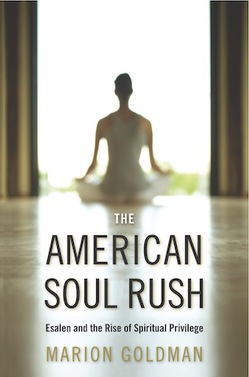 In a new book, a UO sociologist explores the influence of the Esalen Institute on the growth of spiritual practices in America.
In a new book, a UO sociologist explores the influence of the Esalen Institute on the growth of spiritual practices in America.
The Esalen Institute, a famous retreat center overlooking the Pacific Ocean on the cliffs of Big Sur in California, has offered sanctuary to individuals seeking personal growth since its founding fifty years ago.
In its early days, the institute was at the core of a movement redefining spirituality in the U.S. New-age luminaries like Joseph Campbell, who mainstreamed the concept of “finding bliss,” and Abraham Maslow, the father of humanistic psychology, hosted workshops at Esalen that helped popularize quests for self- transformation. Today Esalen continues to host some 500 workshops each year.
 In her new book, The American Soul Rush: Esalen and the Rise of Spiritual Privilege (New York University Press), Marion Goldman, a UO sociologist and professor of religious studies, discusses the influence the center has had on the growth of diverse spiritual practices in America. At the same time, “Goldman’s study is the first book to take a hard look at how issues of social class and male chauvinism have influenced the governance and direction of this seminal institution,” according to a San Francisco Chronicle reviewer.
In her new book, The American Soul Rush: Esalen and the Rise of Spiritual Privilege (New York University Press), Marion Goldman, a UO sociologist and professor of religious studies, discusses the influence the center has had on the growth of diverse spiritual practices in America. At the same time, “Goldman’s study is the first book to take a hard look at how issues of social class and male chauvinism have influenced the governance and direction of this seminal institution,” according to a San Francisco Chronicle reviewer.
Goldman points out that centers like Esalen tend to be frequented by individuals who have the education, financial resources and social connections that allow them to exercise a greater degree of “spiritual privilege” than those less fortunate.
As for control of the institute, it has been not only affluent, but also predominately male. “Privileged men developed and spread Esalen’s unique approaches to . . . spirituality, and they continue to elaborate its doctrine and quietly control the institute,” Goldman wrote.
To explore her thesis, she profiles four men associated with the institute: founder Michael Murphy; David Price, son of co-founder Dick Price; Gordon Wheeler, president of the institute; and Albert Wong, a scientist who radically changed his life as a result of his Esalen experience.
—Patricia Hickson






 study by UO economists, released just before the Rose Bowl, has been picked up by the media far and wide.
study by UO economists, released just before the Rose Bowl, has been picked up by the media far and wide.